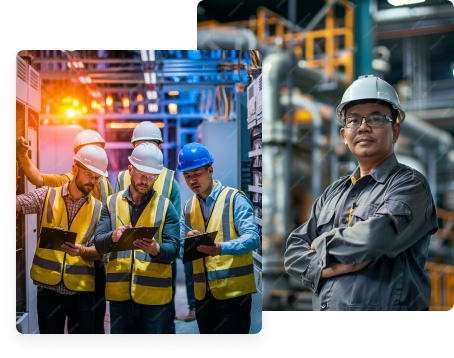API 936 - Refractory Material Design, Application, Installation and Inspection
5-day API 936 workshop on refractory design, application, installation, and inspection in Malaysia and Indonesia. International ICP standard training.
Level
Basic
Type
Facetoface

Trusted by Leading Companies
Our training programs are promoted to engineers, supervisors, and technical teams across the globe, supporting their continuous development and operational competency.












About Training
API 936 - Refractory Material Design, Application, Installation and Inspection
API 936 Refractory Technology: Refractory technology has changed significantly in recent years as new monolithic refractory materials have replaced brick in many industries. Vibratable and pumpable castables with superior properties, as well as significantly improved brick, ceramic fiber products, and other items, make optimum refractory selection complex.
Advanced construction methods must be utilized if these improved materials are to achieve their maximum service life. This course includes a review of refractory fundamentals while emphasizing selection and construction techniques for a variety of applications in refineries, chemical plants, industrial furnaces, incinerators, and utility boilers.
The API 936 covers practical guidelines for inspecting and repairing existing linings, criteria for field testing and accepting new installations, and vendor certification of materials prior to shipment.
Training Objectives
What is API 936 training course objective?
- Upon the successful completion of this course, each participant will be able to:
- Design, apply, install and inspect refractory materials in a professional manner
- Describe the refractory types and classification, test procedures, effects of additives and explain why chemistry alone is not a critical factor
- Emphasize the refractory phase relationships and fracture mechanics
- Inspect and quality control the refractory that includes acceptance/rejection criteria, sampling and testing as well as material and installer certification
- Discuss monolithic refractories including castable and plastic refractories, compositions and properties, anchorage, design and installation and the effects of firing on strength and thermal properties
- Employ the refractory installation techniques including modern refractory state of the art, precast modules, storage & handling, failure analyses, etc.
- Carryout refractory repairs and design various refractory linings
- Employ and apply the refractory selection guidelines from data sheet interpretation and product choice for designed exposure
- Determine and practice the refinery application of refractories including FFCU applications, effects of coking, reformers, transfer lines, Sulphur plants as well as the stacks, creep tests and hot spot detection
Audiences
Who should join API 936 training course by PetroSync?
This course provide an overview of all significant aspect and considerations of refractory for those who are responsible for refractory design, application, installation, and inspection.
You are also welcome to enroll in our class If you aspire to become an API 936 inspector.
Instructor
ME
M. El-Sayed Mahmoud Shama
Mohamed Shama is a senior inspection engineer with over 23 years of extensive experience within the petrochemical, refinery, utilities and oil and gas industries.
He conducted training for API Certification Preparatory, Corrosion and Prevention, National Board and ASMPE PCC-2, ASME VIII Division 1 & 2, ASME V, ASME IV, Lifting Equipment Courses, CSWIP 3.2 and 3.1 Welding Courses, Pressure Relief Valves, NDT Techniques Training Courses.
He has experiences and involve in many huge shutdowns in the oil and gas field including supervision of inspectors and technicians and performing internal inspection for all kind of Piping Systems, Pressure Vessels, Tanks, Boilers, Heat Exchangers, Filters, Towers, Coolers, Columns, Drums and Incinerators, Heaters, Driers, Air Vessels, MCHE, Hot Oil Waste Heat Recovery Units, Spheres, ISO-Containers, Bullets and all kind of refractory materials shaped and un-shaped.
Daily Aims
- Registration and Coffee
- Welcome and Introduction
- Pre – Test
- Introduction of Refractories:
- Types and Classifications
- Test Procedures
- Effects of Additives
- Why Chemistry alone is not a Critical Factor
- Phase Relationships
- Fracture Mechanics
- Refractory Inspection and Quality Control:
- Acceptance / Rejection Criteria
- Sampling and Testing
- Records and Reports
- Quality Control
- Material and Installer
- Certification
- Case Study:
- Brick Failure
- Cracking in Monolithic Lining
- Monolithics:
- Casable and Plastic Refractories
- Compositions and Properties
- Achorage
- Design and Installation
- Effects of Firing on Strength and Thermal Properties
- Case Study:
- SRU Brick Lining
- Acid Gas Incinerator Refractory Demage
- Refractory Installation Techniques:
- Modern Refractory State-of-the-Art
- Self-Flow, Vibe/Pump Cast, Gunite/Shotcrete,
- Rammed Plastics
- Precast Modules
- Storage & Handling
- Joints
- Refractory Repairs:
- Failure Analyses
- Structural (Anchors, Erosion)
- Chemical (Process Reactions, Slag Attack)
- Thermal (Impingement, Spalling, Fusion)
- Case Study:
- Study Exposure to Thermal Cycle in FCUU
- Fibber Modules Fallen From the Roof
- Furnace Linings:
- Design of Various Refractory Lining Types
- Thermal Curing and Drying
- Explosive Spalling
- Effects of Aggressive Atmospheres
- Refractory Selection Guidelines:
- Data Sheet Interpretation
- Product Choices for Design Exposures
- Castable, Plastic, Fiber and Brick Selection
- Criteria for FCB and MSW
- Boilers, Incinerators, Gasifiers and Heaters
- Case Study:
- Failing Brick Walls Deformations or Collapse
- Castable Cracking
- Refinery Application Refractories:
- FCCU Applications
- Effects of Coking
- Reformers
- Transfer Lines
- Sulfur Plants
- Stacks
- Creep Tests
- Hot Spot Detection
- Case Study:
- Flare Brick Failure
- Regeneration Heater H 1301 Accedent Result
- Course Conclusion
- POST-TEST
- Presentation of Course Certificates
Training Schedule
| Code | Start Date | End Date | Locations | Cost | Instructor |
|---|---|---|---|---|---|
| PST0438-202601 | 06 Apr, 2026 | 10 Apr, 2026 | Kuala Lumpur, Malaysia | USD 3385 | M. El-Sayed Mahmoud Shama |
| PST0438-202602 | 13 Apr, 2026 | 17 Apr, 2026 | Bandung, Indonesia | USD 3385 | M. El-Sayed Mahmoud Shama |
| PST0438-202603 | 10 Aug, 2026 | 14 Aug, 2026 | Yogyakarta, Indonesia | USD 3385 | M. El-Sayed Mahmoud Shama |
| PST0438-202604 | 28 Sep, 2026 | 02 Oct, 2026 | Bandung, Indonesia | USD 3385 | M. El-Sayed Mahmoud Shama |
| PST0438-202605 | 23 Nov, 2026 | 27 Nov, 2026 | Kuala Lumpur, Malaysia | USD 3385 | M. El-Sayed Mahmoud Shama |
Why Choose This Training
Credibility
Align with API/ASME standards. Trusted by major operators.
Expert Instructors
Led by industry veterans with real field experience.
Real Case Studies
Practical application of concepts through real world scenarios.
Practical Skills
Hands on calculations and decision making for FFS outcomes.
Trusted by Operators
Delivered to Aramco, ADNOC, SABIC, and other major operators.
Global Training Standard
Recognized across major industries by PetroSync's proven approach.
Professional Training Aligned with Industry Standards
Practical, industry ready training designed for real work environments
Limited seats available

Frequently Asked Questions
-
Direct Transfer
PetroSync Global Pte Ltd Bank Details:
- Account Name: PetroSync Global Pte Ltd
- Bank Name: DBS Bank Ltd
- Bank Code: 7171
- Bank Swift Code: DBSSSGSGXXX
- Branch Code: 288
- Account No: 0288-002682-01-6-022 (USD)
- Bank Address: 12 Marina Boulevard, Level 3, Marina Bay Financial Centre Tower 3, Singapore 018982
-
Terms & Conditions:
- For payment via direct telegraphic transfer, clients must bear both local and overseas bank charges.
-
Credit Card:
Terms & Conditions:
- A 4% credit card processing fee applies for credit card payments.
- Delegates who cancel after the training has been officially confirmed via email are required to pay the full course fee, and no refunds will be granted. However, you may substitute delegates at any time as long as reasonable advance notice is given to PetroSync.
- If PetroSync cancels, postpones, changes the trainer, or alters the training location (classroom/virtual) for any reason, and the delegate is unable or unwilling to attend on the rescheduled date, a 100% credit voucher of the paid contract fee will be issued. This credit voucher can be used for another PetroSync training program, subject to mutual agreement, within one year from the postponement date.
- PetroSync is not responsible for any loss or damage resulting from the cancellation policy and assumes no liability if the event is canceled, rescheduled, or postponed due to force majeure (e.g., natural disasters, war, government actions, industrial actions).
If PetroSync cancels, postpones, changes the trainer, or alters the training location (classroom/virtual) for any reason, and the delegate is unable or unwilling to attend on the rescheduled date, a 100% credit voucher of the paid contract fee will be issued. This credit voucher can be used for another PetroSync training program, subject to mutual agreement, within one year from the postponement date.
Yes, participants who complete the training will receive either an attendance certificate or a completion certificate, depending on the course requirements.
Yes, PetroSync courses adhere to international standards , with expert instructors in fields such as API, ASME, Reliability, and Drilling & Well Engineering.
Yes, PetroSync certificates are widely recognized and can be used to fulfill professional development and certification requirements across various industries.
Yes, PetroSync offers customized training programs tailored to your organization's specific needs (In-house Training).
Participants will receive comprehensive training materials , including slides, handouts, and direct learning from experts with case studies related to the training topic.
PetroSync trainers are industry experts with extensive experience as instructors and consultants in their respective fields, providing professional training with a strong background in the industry.
Yes, trainer profiles, including their qualifications, experience, and expertise, are available on the website: https://www.petrosync.com/training/.
Online training sessions are conducted via user-friendly platforms such as Zoom Premium.
To access PetroSync Online Training, participants need:
- A computer or laptop (tablets or smartphones are not recommended)
- A reliable broadband internet connection (minimum 4 Mbps)
- A webcam and a headset
- Any internet browser (Chrome browser recommended for a better experience)
- A reasonably quiet place
Yes, PetroSync provides live Q&A sessions with instructors to address real-world challenges encountered during training.
The average number of participants varies depending on the topic and participants’ schedules.
- The information you provide will be safeguarded by PetroSync and may be used to keep you informed of relevant products and services.
- As an international group, we may transfer your data globally for the purposes indicated above.
- If you do not wish to share your information with other reputable companies, please tick the box on the registration form.
Please fill out the form on the designated page first. Our team will reach out to you within a maximum of 2x24 hours.
The latest training schedule is available on the website: https://www.petrosync.com/training/.
